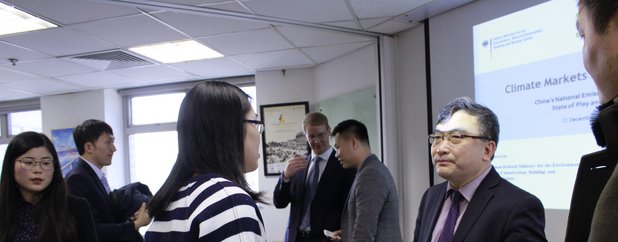
January 2018 - For the past four years or more, the Chinese government has been using pilot projects to gather experience in the lead up to the planned national emissions trading scheme (ETS) which is to be implemented in the near future. Against this backdrop, the AHK Great China Beijing, on behalf of the German Federal Environment Ministry (BMUB), invited industry representatives and experts to a networking meeting on 13 December 2017. At the meeting, some 30 participants gained an insight into how China will transition from its pilot systems to a full-blown national ETS and looked at the potential structural regulations that will apply.
Professor Zou Ji, President of the Energy Foundation China, predicted that the allocation process will initially apply the grandfathering principle, but also foresaw the use of a sectoral benchmarking system and emission certificate auctions. Although the ETS was originally designed to integrate a total of eight sectors into the carbon market, this has been reduced to the energy sector for the time being. Given its comprehensive data resources, its large market share and its high emissions, the sector will pave the way for others to follow in the future.
Chen Zhibin, a senior analyst at SinoCarbon Innovation & Invest, stressed that in addition to introducing the national ETS, China will need other low-carbon initiatives and laws to ensure that the country’s 2030 emissions reduction target can actually be met.
A detailed report on the networking meeting is contained in the January issue of Econet Monitor, a magazine published by AHK Greater China in Beijing. The article can be downloaded here.
Note: The publication is available only in German.
Cookie Settings
Marketing-Cookies werden von Drittanbietern oder Publishern verwendet, um personalisierte Werbung anzuzeigen. Sie tun dies, indem sie Besucher über Websites hinweg verfolgen.
Provider:
Statistik Cookies
Statistik-Cookies dienen der Analyse und helfen uns dabei zu verstehen, wie Besucher mit unserer Website interagieren, indem Informationen anonymisiert gesammelt werden. Auf Basis dieser Informationen können wir unsere Website für Sie weiter verbessern und optimieren.
Provider:
Erforderliche Cookies
Erforderliche Cookies sind für den reibungslosen Betrieb der Website zuständig, indem sie Kernfunktionalitäten ermöglichen, ohne die unsere Website nicht richtig funktioniert. Diese Cookies können nur über Ihre Browser-Einstellungen deaktiviert werden.
Provider: